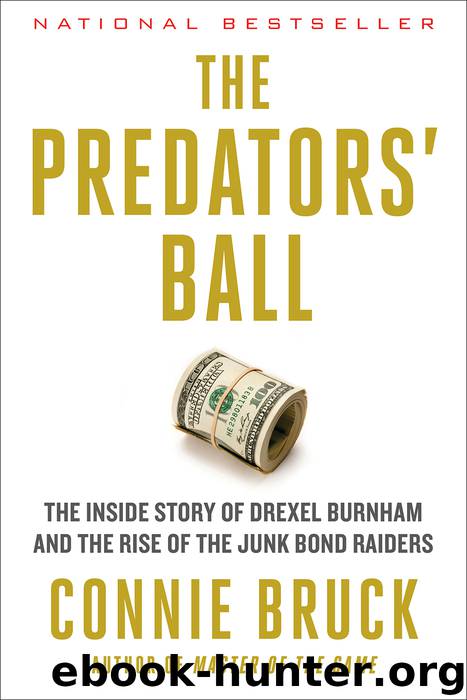Predator's Ball by Connie Bruck

Author:Connie Bruck
Language: eng
Format: epub
Publisher: Simon & Schuster
IN THE junk-bond-takeover war, which began in earnest in early 1985 with Icahn’s raid on Phillips, Revlon was the crucial campaign. That was where the most impassioned corporate defenders were united against Milken’s onslaught; where they unloaded everything in the takeover defense arsenal; and where they fought down to the wire, committed to evading Perelman at all costs to the very last moment. What they lost sight of—particularly as Perelman, by the good grace of Milken, kept upping his all-cash bid—was that Perelman’s money was as good for the shareholders as anyone else’s. In the end, they sought so desperately to escape his clutches that they undid themselves.
To Bergerac and his advisers, and to the rest of the corporate establishment that watched with fear and trembling, the fight for Revlon was a rude introduction to a new world. All the brainpower, clout and class connections that Revlon summoned were no match for the raw financial might of Drexel. Michael Milken had become the great equalizer.
At the outset, it seemed to Revlon’s advisers, and to much of Wall Street, preposterous that Pantry Pride would prevail. For all the furor in Congress over Drexel and its junk-bond-financed takeovers, the facts were that by mid-1985 few had succeeded. In the most highly visible and emotion-charged bids—Icahn’s for Phillips and Pickens’ for Unocal—the companies had fended off the raiders. Triangle’s bid for National Can had succeeded, but that had not exactly started out hostile (National Can was in the midst of trying to do its own LBO, and its directors had said they would consider any higher price by another bidder).
Before Perelman made his bid for Revlon in August 1985, the single instance of a Drexel-backed deal that had started hostile and gone to completion was Coastal Corporation’s takeover of American Natural Resources Company (ANR), which had turned friendly after two weeks’ bitter struggle in April 1985. And ANR, an Oklahoma pipeline-manufacturing company, was not Revlon. As one Pantry Pride strategist recalled, “The attitude on the Street was, How could a major institution like Revlon be taken over by someone like this, a complete unknown—someone who’d made his wealth in cigars and licorice, not to mention with his wife’s money?”
Dennis Levine, the Drexel investment banker who represented Pantry Pride in the Revlon battle, recalled Martin Lipton’s attitude when the fight was just about to begin, in mid-August. Levine was in Lipton’s office at Wachtell, Lipton on another matter. Lipton had just been retained to represent Revlon, and Levine had mentioned that he would be advising Pantry Pride. “ ‘Don’t waste your time,’ Marty said. ‘Pantry Pride will never get Revlon.’ ”
Lipton brought more than the usual defense lawyer’s fervor to this deal. Over the course of the preceding year, Lipton—who had built his firm and his wealth on a takeover practice—had emerged as one of the most outspoken and vehement enemies of what he called the “two-tiered, bust-up junk-bond takeover.” “Two-tiered” referred to the fact that bids had featured a front end which paid
Download
This site does not store any files on its server. We only index and link to content provided by other sites. Please contact the content providers to delete copyright contents if any and email us, we'll remove relevant links or contents immediately.
International Integration of the Brazilian Economy by Elias C. Grivoyannis(111043)
The Radium Girls by Kate Moore(12022)
Turbulence by E. J. Noyes(8042)
Nudge - Improving Decisions about Health, Wealth, and Happiness by Thaler Sunstein(7697)
The Black Swan by Nassim Nicholas Taleb(7118)
Rich Dad Poor Dad by Robert T. Kiyosaki(6622)
Pioneering Portfolio Management by David F. Swensen(6294)
Man-made Catastrophes and Risk Information Concealment by Dmitry Chernov & Didier Sornette(6013)
Zero to One by Peter Thiel(5793)
Secrecy World by Jake Bernstein(4746)
Millionaire: The Philanderer, Gambler, and Duelist Who Invented Modern Finance by Janet Gleeson(4473)
The Age of Surveillance Capitalism by Shoshana Zuboff(4287)
Skin in the Game by Nassim Nicholas Taleb(4244)
The Money Culture by Michael Lewis(4202)
Bullshit Jobs by David Graeber(4183)
Skin in the Game: Hidden Asymmetries in Daily Life by Nassim Nicholas Taleb(3998)
The Dhandho Investor by Mohnish Pabrai(3763)
The Wisdom of Finance by Mihir Desai(3741)
Blockchain Basics by Daniel Drescher(3577)
